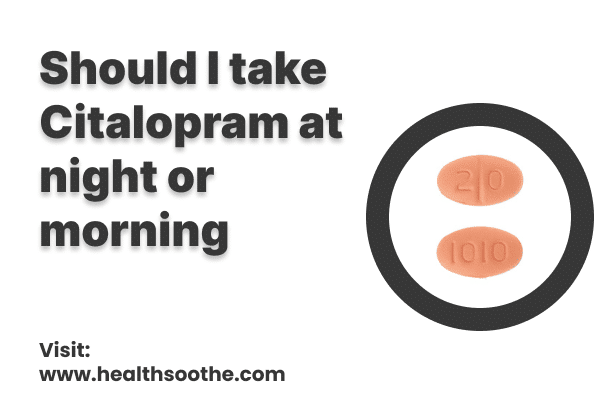Our bodies operate on an internal clock called the circadian rhythm, regulating sleep-wake cycles, hormone production, and other biological functions. This rhythm follows approximately a 24-hour cycle and can influence drug metabolism and response. Research indicates that taking citalopram at night may synchronize with natural serotonin fluctuations, potentially enhancing its therapeutic benefits.
Circadian rhythms vary among individuals. Some individuals naturally have a delayed circadian rhythm, feeling more alert and active later in the day. For them, taking citalopram at night might be advantageous as it aligns with their physiological state. Conversely, those with an advanced circadian rhythm may find morning administration more effective, coinciding with their wakeful and alert state.
The timing of medication intake can also affect experienced side effects. For instance, taking citalopram at night could reduce daytime drowsiness by utilizing its sedative effects during sleep. However, individuals experiencing insomnia as a side effect might benefit from morning administration to prevent sleep disturbances.
Pros and Cons of citalopram
Pros:
- Effective Treatment
- Well-Tolerated
- Flexible Dosage Forms
- Improved Sleep Quality
Cons:
- Side Effects
- Sexual Side Effects
- Withdrawal Symptoms
Differences Between citalopram and Lamotrigine
Citalopram:
It is a selective serotonin reuptake inhibitor (SSRI) primarily used to treat major depressive disorder and panic disorder.
Lamotrigine:
It is an anticonvulsant medication primarily used to treat epilepsy and bipolar disorder. It can help prevent seizures and stabilize mood in individuals with bipolar disorder.
Alternative to citalopram
Tricyclic Antidepressants (TCAs):
TCAs such as amitriptyline (Elavil) and nortriptyline (Pamelor) are an older class of antidepressants that are sometimes used when other medications have been ineffective. However, they tend to have more side effects compared to newer antidepressants like SSRIs and SNRIs.
The Advantages of Taking Citalopram at Night
Administering citalopram at night offers several advantages that contribute to enhanced treatment efficacy and improved well-being.
- Enhanced Sleep Quality: Recent evidence suggests that taking citalopram at night can improve sleep quality in individuals with depression and anxiety. By aligning medication intake with the body's natural sleep-wake cycle, nighttime administration helps regulate serotonin levels during sleep, promoting better sleep quality and restorative rest.
- Reduced Daytime Side Effects: Nighttime intake of citalopram may also lead to a decrease in daytime side effects. By taking the medication before bedtime, individuals may experience side effects such as drowsiness or fatigue during sleep rather than throughout the day. This can result in improved daytime functioning and an overall better quality of life.
- Improved Mood and Anxiety Control: Moreover, taking citalopram at night may enhance its efficacy in regulating mood and controlling anxiety symptoms. With the medication active during sleep, its effects can contribute to a more balanced and positive mood throughout the day. This can ultimately lead to increased overall well-being and improved ability to cope with daily stressors.
For individuals seeking a refill of 10mg, 20mg, or 40mg Citalopram prescription, Cabinet Pharmacy offers direct-to-door shipping, stunning glass bottles, and the lowest-ever prices. Explore our options for convenient medication delivery and affordable rates.
Common Side Effects of Citalopram
Like many other antidepressant medications, citalopram carries potential side effects that users should be aware of. These include:
- Nausea
- Drowsiness
- Constipation
- Vomiting
- Stomach pain
- Headache
- Decreased appetite
- Weight loss
- Frequent urination
- Trouble falling asleep or staying asleep
- Joint or muscle pain
- Dry mouth
- Heavy menstrual periods
Additionally, individuals taking citalopram may experience sexual side effects such as a decreased sex drive. It's essential to remain patient as these side effects, including other common ones, typically diminish after the initial adjustment period of about a week or two. Users should observe any new or persistent side effects and discuss them with their healthcare provider.
While rare, citalopram can also lead to more serious effects, including:
- Low sodium blood levels
- Symptoms of angle closure glaucoma
- Teeth grinding
- Seizures
Daily doses exceeding 40mg can increase the risk of abnormal heart rhythms or irregular heartbeat. If taking more than 40mg daily, individuals should consult a healthcare professional. Seek immediate medical attention if experiencing cardiac side effects like irregular heartbeat, dizziness, or shortness of breath.
Combining citalopram with other medications or supplements that elevate serotonin levels, such as selective serotonin reuptake inhibitors, can lead to serotonin syndrome. This condition, characterized by excessively high serotonin levels, can range from mild to severe and includes symptoms like shivering, excessive sweating, elevated blood pressure, and even coma or death in severe cases.
Certain medications and supplements, including monoamine oxidase inhibitors, amphetamines, and St. John's wort, should not be used concurrently with citalopram due to potential drug interactions. Always inform healthcare providers about all medications and supplements before starting citalopram.
It's crucial not to abruptly discontinue citalopram, even if symptoms improve, as withdrawal symptoms may occur. These can include irritability, headache, nausea, dizziness, or tingling sensations on the skin. Gradual discontinuation under medical supervision is recommended.
Conclusion



